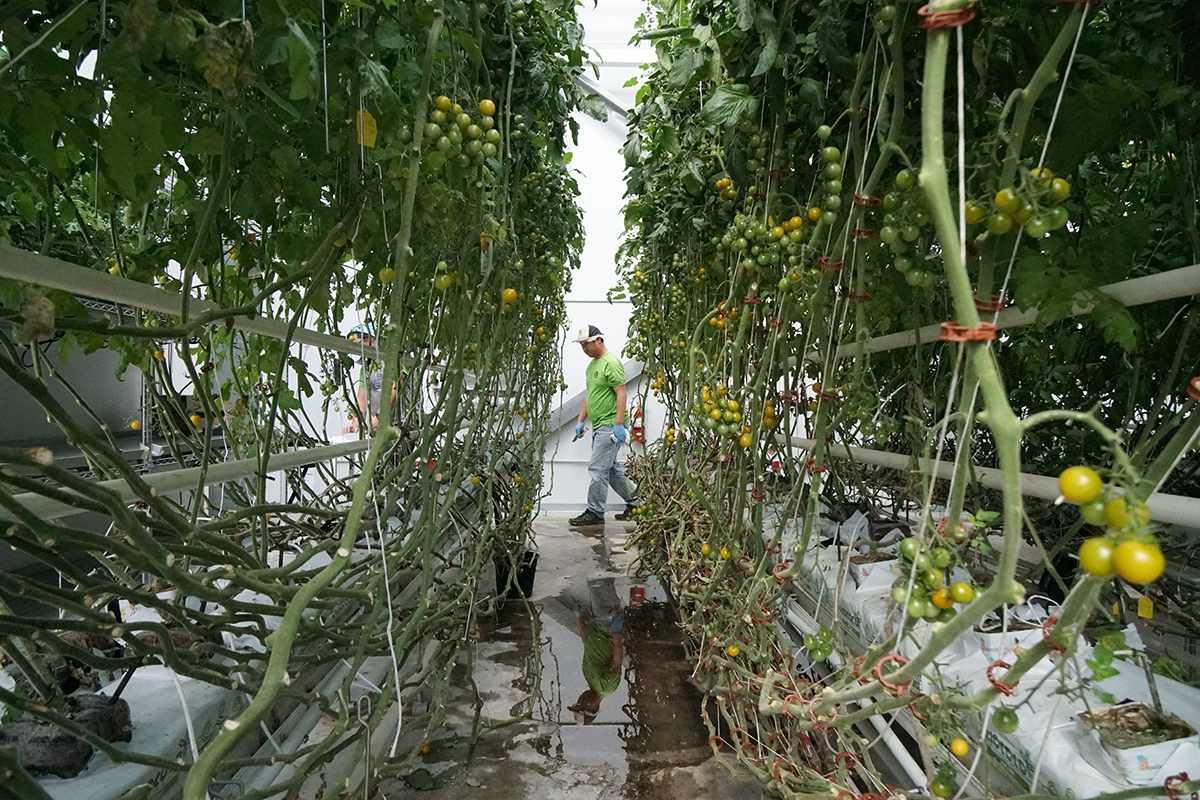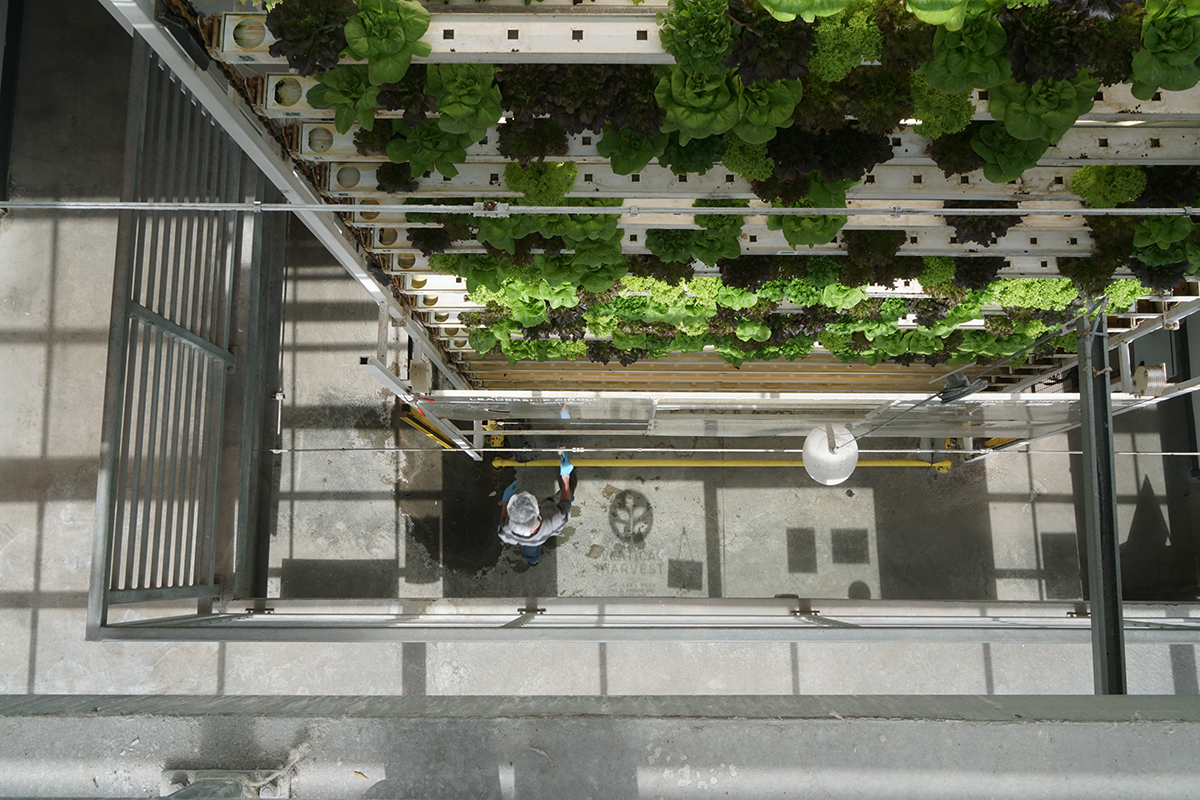
One might not associate a parking garage with farming, but that’s where residents of Jackson, Wyoming, have been getting some of their produce since 2016. That year, Vertical Harvest opened its 13,500-square-foot downtown greenhouse, where it grows and sells around 100,000 pounds of produce annually.
Pedestrians strolling by Vertical Harvest’s three-story glass walls see rows of greens, which they can purchase from the small market inside. What cannot be readily discerned, however, are the unique working conditions inside. More than half of the company’s 30-some employees are people with a disability such as spina bifida, visual impairment, brain injury, or autism. Caroline Croft Estay and Nona Yehia started Vertical Harvest in part to give this diverse group the opportunity to work in an environment that works for them.
In 2018, the unemployment rate for people with disabilities in the U.S. was 8 percent — more than twice the rate for those without a disability, according to the Bureau of Labor Statistics. But that figure accounts only for those actively in the workforce. In Wyoming, 45.6 percent of adults with disabilities are employed, according to the Institute on Disability at the University of New Hampshire. That figure puts the state in the top 10 nationally.
Yehia was inspired to start Vertical Harvest in part by her brother, who has a developmental disability. “Caroline and I came together with a belief that this population deserves consistent, meaningful employment,” she said.
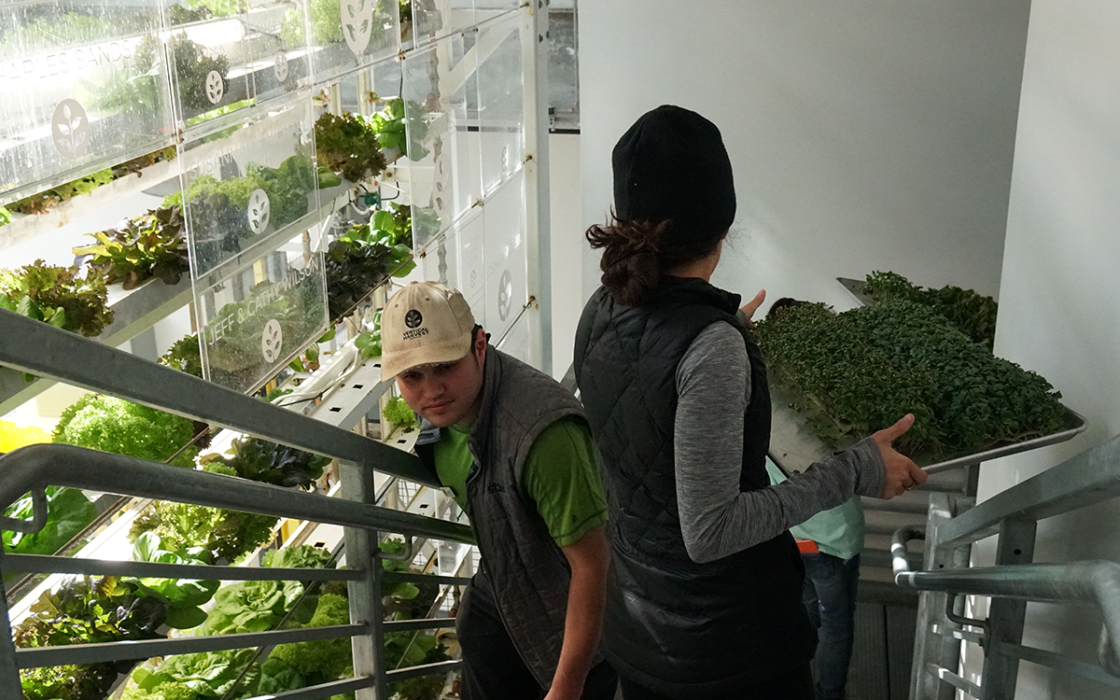
Johnny Fifles, 29, bustles up and down the stairs as he attends to myriad tasks. On this day, his list includes cleaning planting trays and laying microgreen seeds on cellulose mats in a single layer. “No more, no less,” he said. He occasionally gives tours to curious tourists.
Seven carousels in the greenhouse shuttle trays of vegetables from floor to floor, allowing all employees to access the plants regardless of mobility requirements.
Fifles, who grew up here, has high-functioning autism. After attending college at the University of Wyoming, Fifles returned to Jackson, where he worked in housekeeping at a local hotel until getting this job in 2016. He works 40 hours weekly, and makes more money than he did at the hotel. “I’ve got room to grow here,” he said.
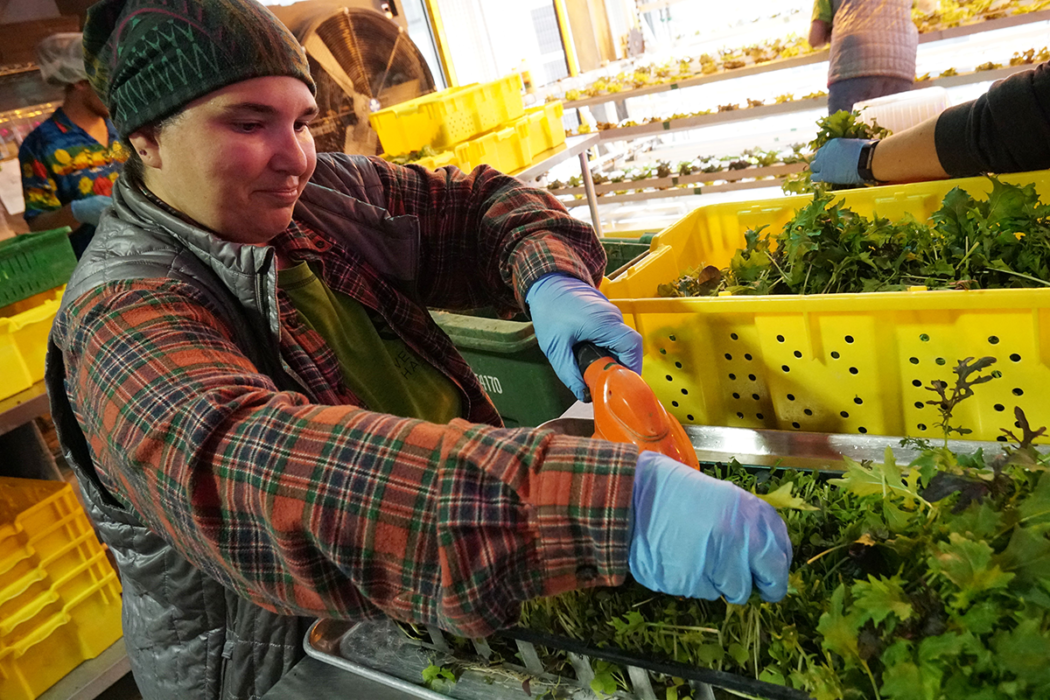
Amanda Macfarlane was born and raised in Jackson. It’s been nearly 20 years since she had a serious allergic reaction and choked on a piece of gum; the incident deprived her brain of oxygen for 16 minutes. She now struggles with a host of challenges such as impulse control.
For 11 years, she was a cashier at a large department store. When her friend and now-coworker Sammi LaBounta told her about a job at Vertical Harvest, Macfarlane jumped at the opportunity. Today, she works in the packaging department, among other roles.
“Working here has totally opened my eyes,” she said. “I went from working for corporate America to working in a family environment.”
Macfarlane feels that she gets emotional support at Vertical Harvest that’s absent in a typical workplace.
“I feel like I can come to my work family and say, ‘I need help,’ and they’re the ones who ask, ‘What’s wrong?’” she said. “They let me cry when I need to cry.”
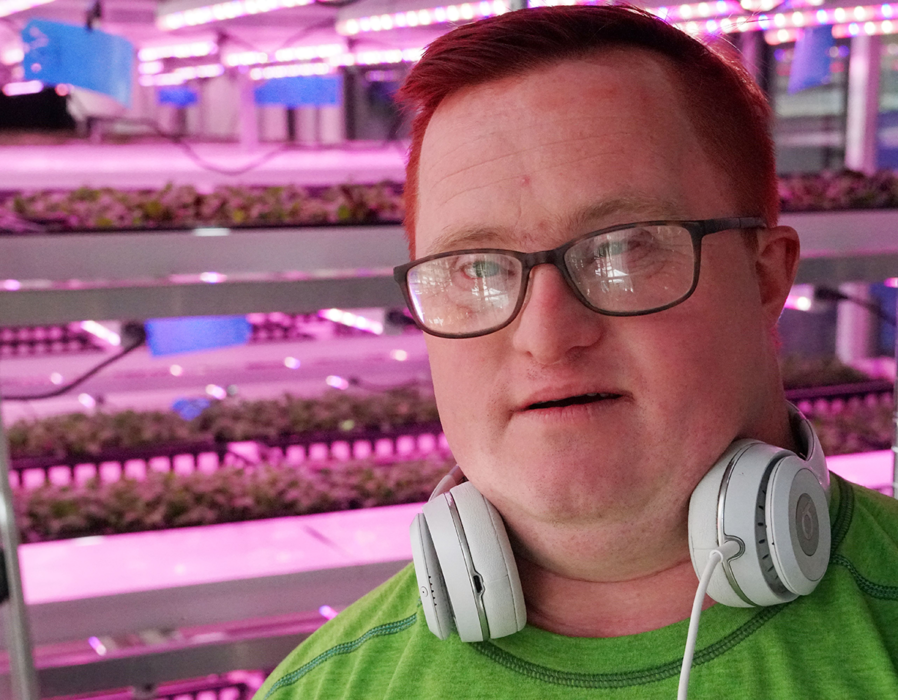
That support is built into the workweek at Vertical Harvest. Co-founder Croft Estay, who studied psychology and education, developed a training model that uses customized employment plans to train and support her workers.
One example is a weekly meeting called “the boost.” Each Wednesday, employees pack into the tiny breakroom, where Croft Estay leads a discussion about topics like bullying or voting rights. At a recent meeting, she discussed advocacy with the group, several of whom shared their experiences standing up for someone else. Tim McLaurin, pictured above, was moved nearly to tears discussing times he defended his brother, who has a visual impairment. “I say, ‘Just keep walking,’” the 33-year-old said.
McLaurin’s job at Vertical Harvest and a second job as a security guard at the Jackson Hole Playhouse allow him to live on his own. “I’m really independent,” he said.
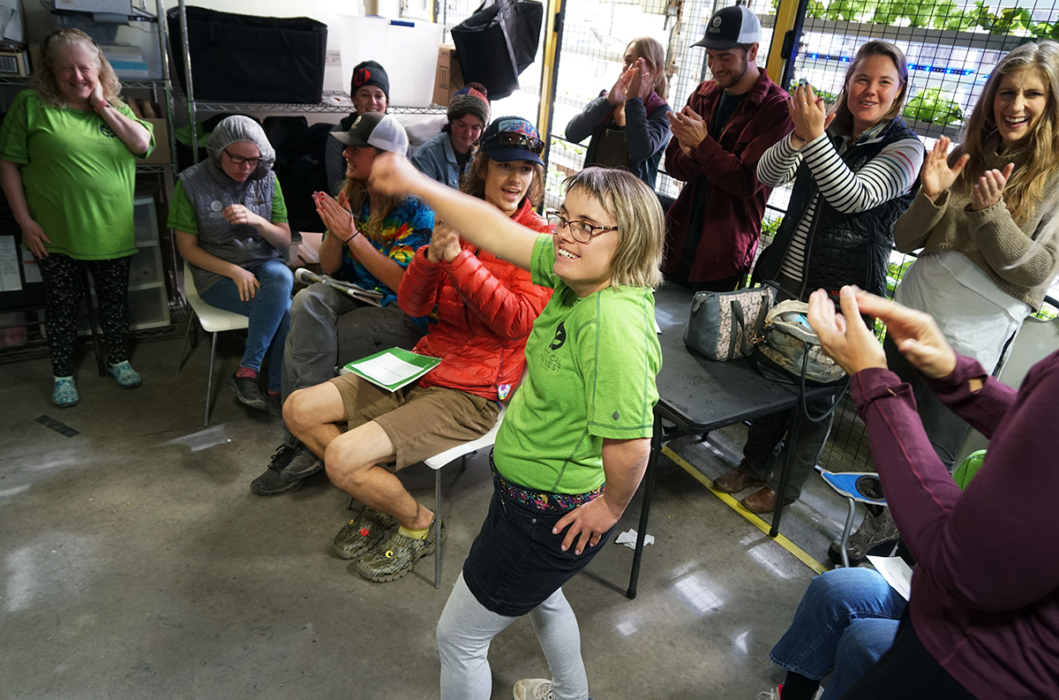
Boosts also feature a monthly dance-off between two employees. Mycah Miller, above, took to the impromptu dance floor on this day, but she wasn’t alone for long — the meeting usually disintegrates into an all-out, albeit brief, dance party.
It isn’t easy running a business where more than half the employees have a disability. “Every day is a production,” said Croft Estay. “I mean, it’s like putting on a performance. Some days it’s easy, and some days there’s a lot of fires to put out.”
It can take some employees 800 hours to learn a task others might learn in eight. It’s understandable that other businesses might shun that investment in time, energy, and money. When Vertical Harvest was founded, Croft Estay and Yehia also created a nonprofit, called Cultivate, to raise money for those additional costs. In the future, Cultivate might provide funding for other businesses adopting a more inclusive workforce.
The investment is worth it. “We believe that diversity and inclusion is important for any business,” said Yehia.
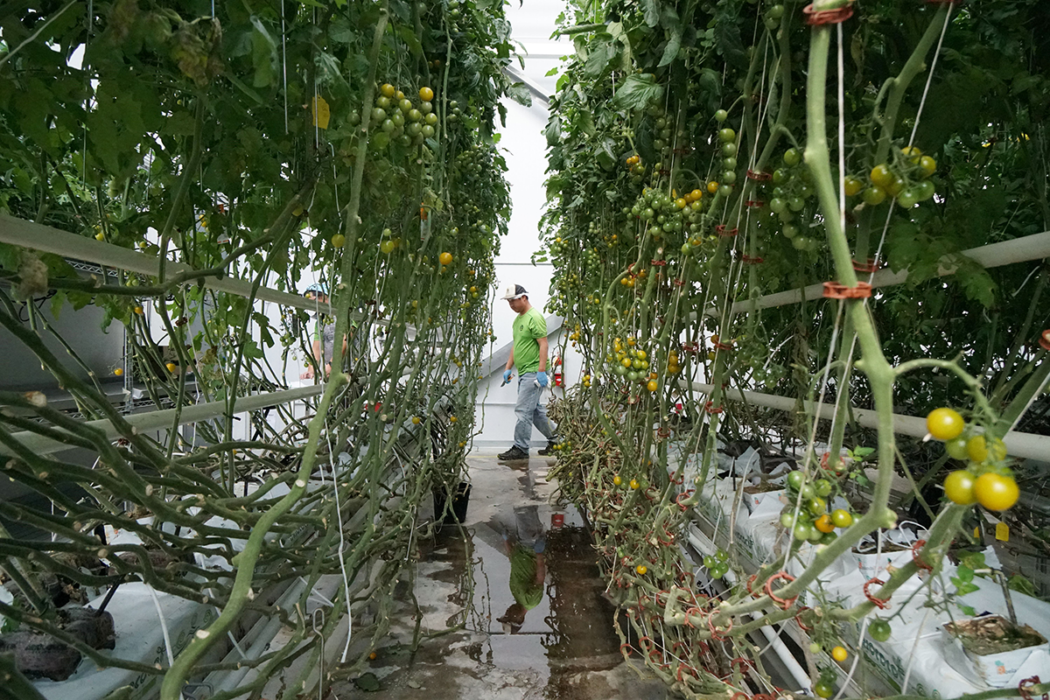
Vertical Harvest’s third floor, where glass ceilings hang high above vines heavy with tomatoes, is warm and exudes a church-like atmosphere of reverence.
Croft Estay said that, after nearly four years, she understands which areas of the greenhouse are best suited to different personalities. For instance, employees on the autism spectrum with limited verbal skills likely do well in the detail-oriented tasks associated with growing tomatoes and microgreens, whereas the more social employees tend to be productive and happy in the packaging department.
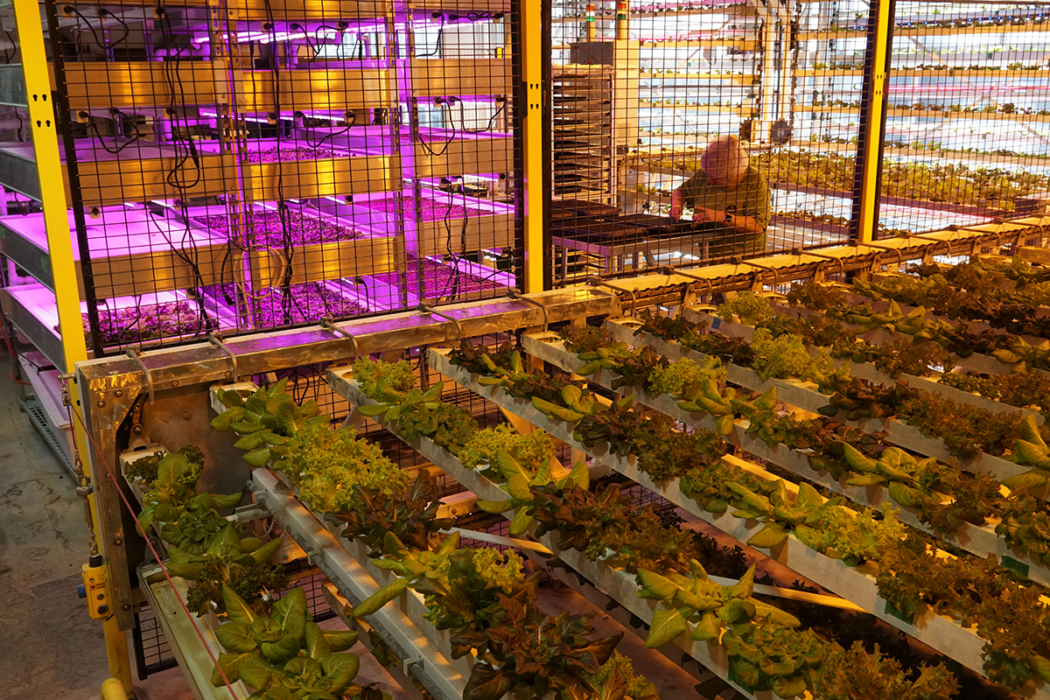
Vertical Harvest grows as much produce as a typical 5-acre plot on a 98 percent smaller footprint. Providing fresh greens, basil, cilantro, and tomatoes in an area where the growing season is four months at best reduces the amount of food trucked into Jackson. And the locals love it.
“The produce is consistently fresh and flavorful, which is the most important thing,” said Josh Governale, executive chef and co-owner of Orsetto Italian Bar and Eatery a few blocks from the greenhouse.
Governale is more than a customer — he put financial support behind the endeavor. His nephew has a disability, and Governale appreciates Vertical Harvest’s inclusive workplace. “I think it’s great for the community,” he said.
This story was supported by the Solutions Journalism Network, a nonprofit organization dedicated to rigorous and compelling reporting about responses to social problems. solutionsjournalism.org

